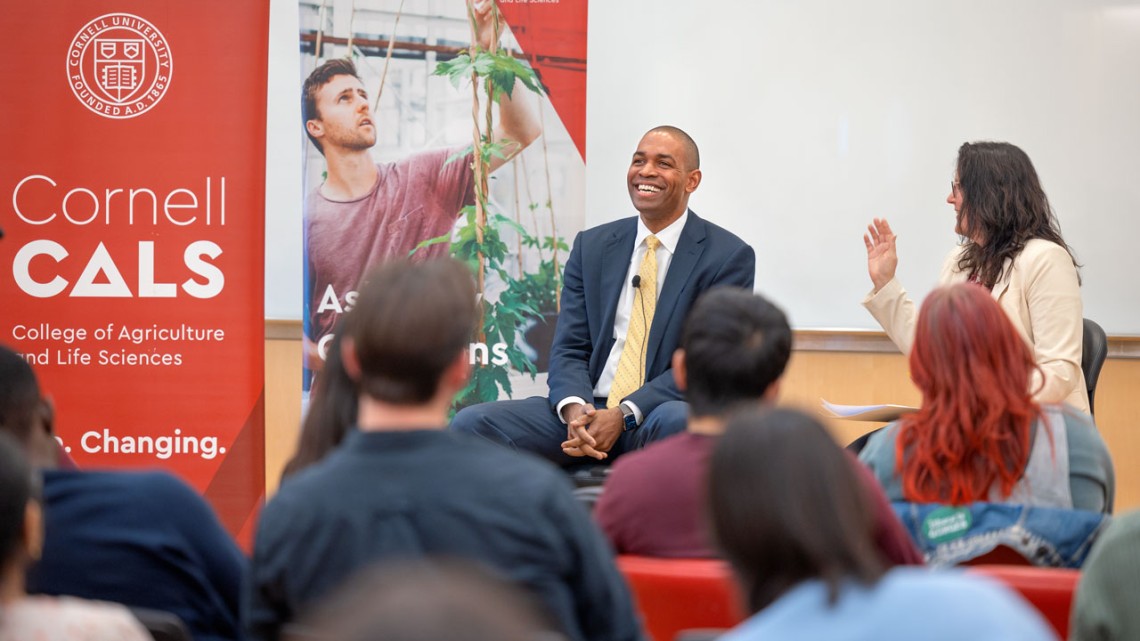New York Lt. Gov. Antonio Delgado engaged with students and faculty on topics ranging from biological engineering to nutrition to 4-H youth development programs – and how they impact New York residents – during his first tour of the Ithaca campus on Feb. 2.
The short afternoon tour stopped by the laboratory of Buz Barstow, Ph.D. ’09, assistant professor of biological and environmental engineering (College of Agriculture and Life Sciences). There, Delgado learned how Cornell scientists are synthesizing microbes to sustainably recover rare earth elements – needed to run smart phones, computers and improve sustainable energy infrastructure such as wind turbines and electric vehicles.
Delgado spoke briefly with members of the Barstow lab, including Stacie Dressel ‘24, doctoral students Sabrina Marecos and Sean Medin, and researchers Brooke Pian ’13 and Timothy Sheppard ’22, M.Eng.’22, as they explained state-of-the-art processes.
Stopping for a moment, Delgado asked about finding rare earth elements, “You’re not using machinery?”
No, Barstow said, microbes are doing all the work. “We’re replacing strong acids with biodegradable, weak acids.”
Barstow told Delgado about how his first postdoctoral researcher Alexa Schmitz, Ph.D. ’18, had engineered the bacterial microbe Gluconobacter oxydans to help extract rare earth elements cleanly. He explained how Schmitz is now the founder and CEO of a new New York-based company REEgen, which recently joined Cornell’s Praxis Center business incubator.
“We want to replace all these chemicals with natural solutions, as biology can do what the acids and all these waste products used to do. We want to get away from that,” said Benjamin Houlton, the Ronald P. Lynch Dean of CALS, who accompanied Delgado on the tour. “We want to provide national security, reduce risk and reduce reliance on [an international] supply chain. You can build a workforce out of these things. There’s a whole future in synthetic biology.”
Last August, Delgado toured the Cornell AgriTech facilities in Geneva, New York, to gather information for the upcoming federal farm bill. This visit was the lieutenant governor’s first tour of Cornell’s main campus.
Prior to becoming lieutenant governor in May 2022, appointed by Gov. Kathy Hochul, Delgado served in the U.S. House of Representatives from New York’s 19th District. He was elected to this post last November for a full term.
Later in the afternoon, during a roundtable session, four faculty members briefed Delgado on Cornell research and programming that directly affects state residents.

Lt. Gov Antonio Delgado (right) speaks with Neil Lewis Jr. (left), Tashara M. Leak (middle), and Julie Suarez (white sweater).
Neil Lewis Jr. ’13, assistant professor of communication and social behavior (CALS), with an appointment as an assistant professor of communication research at Weill Cornell Medicine, told the lieutenant governor about Cornell’s Action Research Collaborative (ARC). Lewis, a co-director of ARC, explained that it is a university hub that brings researchers, practitioners, community members and policymakers together to collaborate on initiatives to address equity issues for society’s marginalized people.
“It is vital to develop meaningful partnerships with communities in carrying out our work,” said Rachel Dunifon, the Rebecca Q. and James C. Morgan Dean of the College of Human Ecology, who met the lieutenant governor earlier in the day. “Through community-engaged research, the Action Research Collaborative is taking on pressing social issues like food insecurity, childhood obesity, educational inequality and racial injustice.
“The ARC fits perfectly with the College of Human Ecology’s vision and goals, supporting and enhancing the work of our faculty, and strengthening Cornell’s presence and impact in New York,” she said.
Tashara Leak, assistant professor in nutritional sciences (College of Human Ecology) and co-director of ARC, described her work improving health and wellbeing of adolescents in urban communities. Her Advanced Cooking Education program is a 12-week 4-H afterschool club that engages New York City middle school students in mindfulness, professional development, nutrition education and cooking labs preparing culturally diverse dishes.
Leak explained that while 4-H is often associated with rural communities, there is a need to promote positive youth development in urban settings like New York.
For families in poverty, Leak said, with a parent working a late shift, it falls upon older siblings to cook for their brothers and sisters. The program teaches the teens life skills to manage these responsibilities.
“That program sounds amazing,” Delgado said.
Angela Odoms-Young, associate professor of nutrition (CHE) is the director of the Food and Nutrition Education in Communities Program and New York State Expanded Food and Nutrition Education Program. She told Delgado how she implements federal policies that promote health equity, food justice and community resilience.
Elad Tako, associate professor of food science, discussed the “double burden of malnutrition,” in which one-third of New York’s children are obese or overweight, and most lack iron and zinc in their diets – particularly in low-income communities. Tako suggested a policy shift to address the problem, from focusing on food quantity to quality.
Delgado also met with about 100 undergraduate students, who peppered him with questions about New York and careers. In the session – moderated by Julie Suarez, associate dean for land-grant affairs (CALS) and held in Stocking Hall – the lieutenant governor shared stories from his own experience.
“There’s nothing more important in life than doing what you love and doing what you’re passionate about. And I think that’s guided me throughout the course of my life,” he said.
“Own this time in your life, be diligent in that regard,” he said. “Time is precious and you’re not going to have this time forever. I think if you do that, you’ll be better for it. It will make your life a lot more meaningful and fulfilling.”
Delgado offered students parting advice. “One more word: Love,” he said. “Love yourself. Love your family. Love your community. Love.”
The students applauded.





